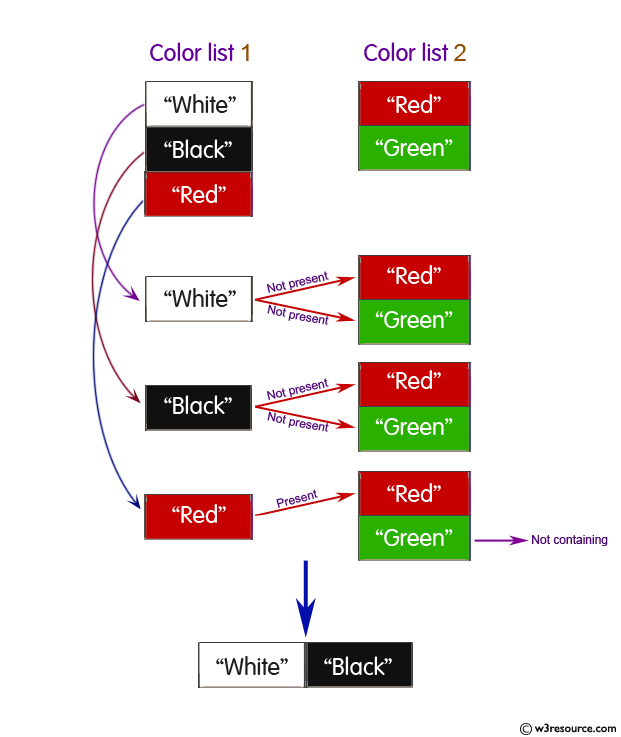Python: Print out a set containing all the colors from a list which are not present in other list
Unique Colors Finder
Write a Python program that prints out all colors from color_list_1 that are not present in color_list_2.
Test Data:
color_list_1 = set(["White", "Black", "Red"])
color_list_2 = set(["Red", "Green"])
Expected Output :
{'Black', 'White'}
Pictorial Presentation:

Sample Solution-1:
Python Code:
# Create two sets, color_list_1 and color_list_2.
color_list_1 = set(["White", "Black", "Red"])
color_list_2 = set(["Red", "Green"])
# Print the original elements of the sets.
print("Original set elements:")
print(color_list_1)
print(color_list_2)
# Calculate and print the difference of color_list_1 and color_list_2.
print("\nDifference of color_list_1 and color_list_2:")
print(color_list_1.difference(color_list_2))
# Calculate and print the difference of color_list_2 and color_list_1.
print("\nDifference of color_list_2 and color_list_1:")
print(color_list_2.difference(color_list_1))
Sample Output:
Original set elements:
{'White', 'Black', 'Red'}
{'Green', 'Red'}
Differenct of color_list_1 and color_list_2:
{'White', 'Black'}
Differenct of color_list_2 and color_list_1:
{'Green'}
Explanation:
The said code defines two sets called "color_list_1" and "color_list_2" containing string elements.
The elements of both sets are then printed.
After that, it uses the difference() method on "color_list_1" and passes "color_list_2" as an argument to it. This method returns the elements that are in the "color_list_1" but not in "color_list_2".
Again it uses the difference() method on "color_list_2" and passes "color_list_1" as an argument to it. This method returns the elements that are in the "color_list_2" but not in "color_list_1".
The output of the code will be:
Differenct of color_list_1 and color_list_2:
Original set elements:
{'Red', 'White', 'Black'}
{'Red', 'Green'}
{'White', 'Black'}
Differenct of color_list_2 and color_list_1:
{'Green'}
Sample Solution-2:
Python Code:
# Create two sets, color_list_1 and color_list_2.
color_list_1 = set(["White", "Black", "Red"])
color_list_2 = set(["Red", "Green"])
# Print the original elements of the sets.
print("Original set elements:")
print(color_list_1)
print(color_list_2)
# Calculate and print the difference of color_list_1 and color_list_2 using set difference (-) operator.
print("\nDifference of color_list_1 and color_list_2:")
print(color_list_1 - color_list_2)
# Calculate and print the difference of color_list_2 and color_list_1 using set difference (-) operator.
print("\nDifference of color_list_2 and color_list_1:")
print(color_list_2 - color_list_1)
class="samp-out">Sample Output:
Original set elements:
{'Red', 'Black', 'White'}
{'Red', 'Green'}
Differenct of color_list_1 and color_list_2:
{'Black', 'White'}
Differenct of color_list_2 and color_list_1:
{'Green'}
Explanation:
The said code defines two sets, "color_list_1" and "color_list_2", with the initial elements "White", "Black", "Red" and "Red", "Green" respectively.
It then prints the original sets, followed by the difference between color_list_1 and color_list_2 (the elements in color_list_1 that are not in color_list_2) and the difference between color_list_2 and color_list_1 (the elements in color_list_2 that are not in color_list_1).
Here the "-" operator is used to get the difference between two sets.
For more Practice: Solve these Related Problems:
- Write a Python program to find all colors present in color_list_2 but not in color_list_1.
- Write a script that finds common colors in two given sets.
- Write a Python function that returns the symmetric difference between two sets of colors.
- Write a program to merge two sets of colors and remove duplicates before displaying the result.
Go to:
Previous: Write a Python program to print out all even numbers from a given numbers list in the same order and stop the printing if any numbers that come after 237 in the sequence.
Next: Write a Python program that will accept the base and height of a triangle and compute the area.
Python Code Editor:
What is the difficulty level of this exercise?
Test your Programming skills with w3resource's quiz.
